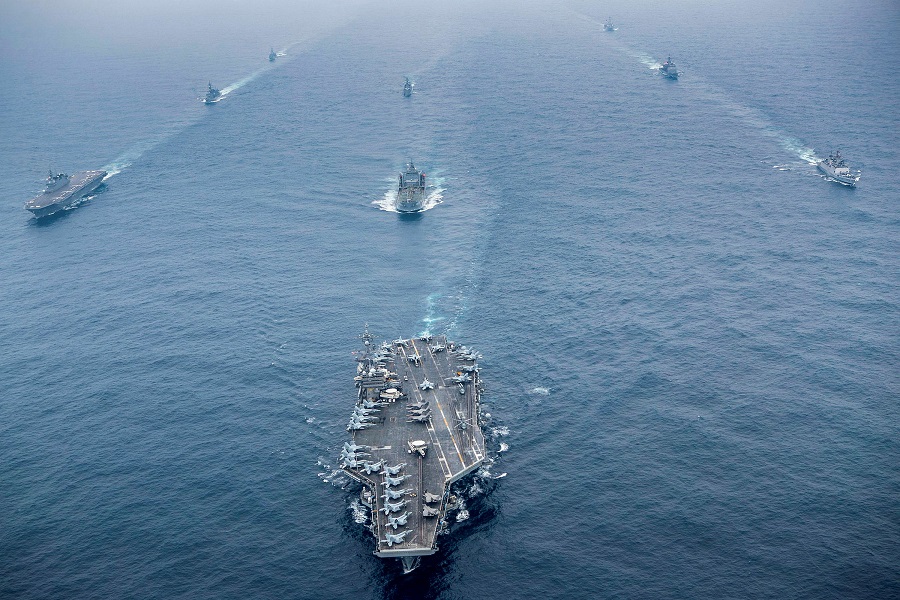Time for the Quad to bare its teeth on regional security

Prime Minister Anthony Albanese will soon host his counterparts from India, Japan and the US for the most significant leaders’ gathering in Australia since the Cold War.
It is a powerful gesture that these four Indo-Pacific democracies and maritime powers feel the strategic context is acute enough that their leaders are scheduling these meetings of the Quad regularly and in person. Amid Russia’s war against Ukraine and China’s steady trajectory of authoritarian aggression, the meeting scheduled for 24 May confirms that the Quad is here to stay.
What’s needed now is for this vital grouping to continue building on its objectives, including by reconfirming security and elevating defence as legitimate priorities. Security and defence cooperation will create greater stability in the Indo-Pacific by helping to balance and deter Beijing’s growing military ambitions and capabilities.
Following the demise of the original Quad in 2008 because of concerns it was upsetting Beijing, its revival in 2017 saw a softly, softly public approach. Even the original name, Quadrilateral Security Dialogue, was truncated to remove the word ‘security’ and blunt the pushback from Beijing, which fears that any collective action might constrain its goal of regional dominance.
When Quad foreign ministers held their first meeting in New York in 2019, it was well known that Beijing was the focus privately. Indeed, concern about Beijing’s aggression had compelled the four nations to revive the grouping.
However, a significant effort was made to reassure the wider region, particularly Southeast Asia, that the meeting wouldn’t stoke tensions. The group therefore promoted a positive and practical agenda, including a focus on the Quad’s original purpose of disaster relief, as well as vaccine diplomacy and infrastructure development.
The reassurance-building has been sensible and effective. Beijing’s propaganda campaign, aiming to paint the Quad as an Asian NATO and claim it was the four democracies that were provoking tensions and destabilising the region, has largely fallen flat.
The Quad’s foundations today are strong and bipartisan across the four capitals. While India’s external affairs minister, S. Jaishankar, remains from 2019, Australia and the US have changed governments and Japan has changed leaders, with the Quad only increasing as a priority. Once a mere side meeting if the counterparts were fortuitously together, the Quad has become a centrepiece of overseas travel for leaders, with US President Joe Biden and Indian Prime Minister Narendra Modi adding valuable visits to Papua New Guinea as part of their trips.
The test now is to build an ambitious, long-term agenda that ensures the pendulum doesn’t swing so far to reassurance that the security dimension is expunged. In March, Japanese Foreign Minister Yoshimasa Hayashi told an audience in New Delhi that the Quad is ‘not for security issues, nor military issues’.
The Quad should not be defence-led, but nor should it be defence-absent. Instead, it should be clear that security and defence are valid, and in fact vital, matters for the group to talk about, given their contribution is mandatory to regional deterrence and stability. Reassurance without deterrence does not create a sustainable balance.
A Quad that self-censors would effectively hand Beijing a veto on the topics in which the Quad is allowed to invest. That would play into Beijing’s strategy, which consists of a ‘plan A’ to end the Quad altogether, and a more realistic ‘plan B’ to make the grouping impotent. To this end, the leaders should incorporate the Malabar naval exercise—which is held between the four countries—specifically as a Quad component. With Australia to host the exercise this year, the timing is perfect.
The Quad should also introduce a regular defence ministers’ meeting. That might be too much, too soon, for the Sydney meeting, but it should be an ambition. Deliberately suppressing the defence and security dimensions would mean the regional messaging on security is left to other groups such as AUKUS.
Indeed, overcaution could have consequences for AUKUS’s second pillar, through which Australia, the UK and US cooperate on developing advanced-technology capabilities such as hypersonics, quantum and artificial intelligence.
Over time, AUKUS pillar two will need to expand to take advantage of the technology skills of Japan, India and others such as South Korea. This expansion could be harder if we have already submitted to Beijing’s pressure by keeping the Quad’s security aspirations stunted.
None of this, of course, need detract from the Quad’s focus on health security, climate, critical technologies, space, cyber, infrastructure, disaster relief or counterterrorism.
If we want a healthy strategic balance in the region, the Quad should cover everything from economic prosperity to defence. Otherwise, it risks becoming ineffective and could end up mirroring the diminution of the Five Eyes group, which has become increasingly ineffective at the ministerial level since New Zealand tried to reassure Beijing that the group doesn’t do foreign policy and is only a formal meeting of intelligence officials.
These moves don’t win reciprocity; they only invite greedier demands. A Quad that offers the region both economic and security alternatives can win and maintain the confidence of other countries while simultaneously providing a counterbalance to Beijing’s attempt at a sphere of influence.
This can provide long-term reassurance to a region that wants to know these four countries are here to stay and here to discuss all of the region’s strategic priorities—even the touchy ones.